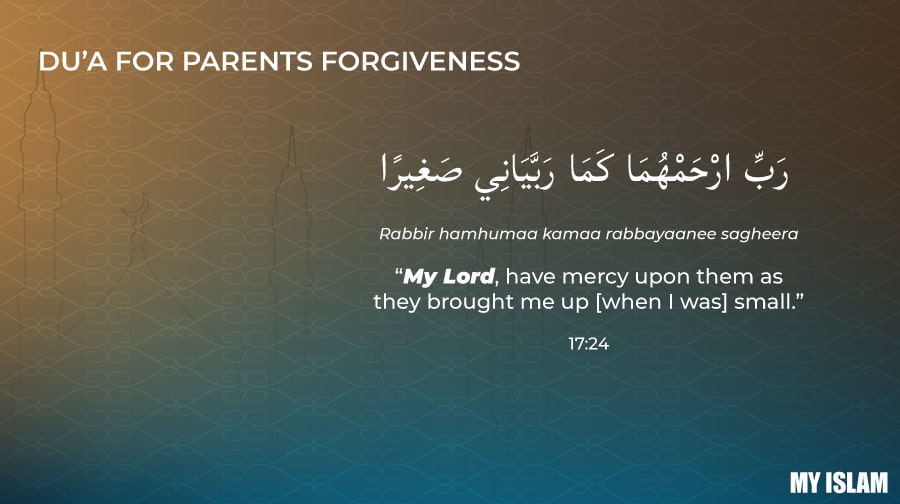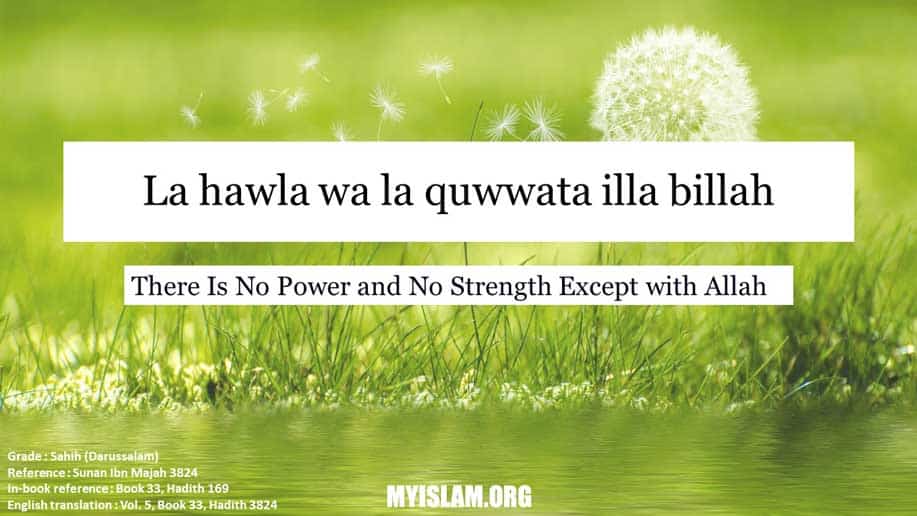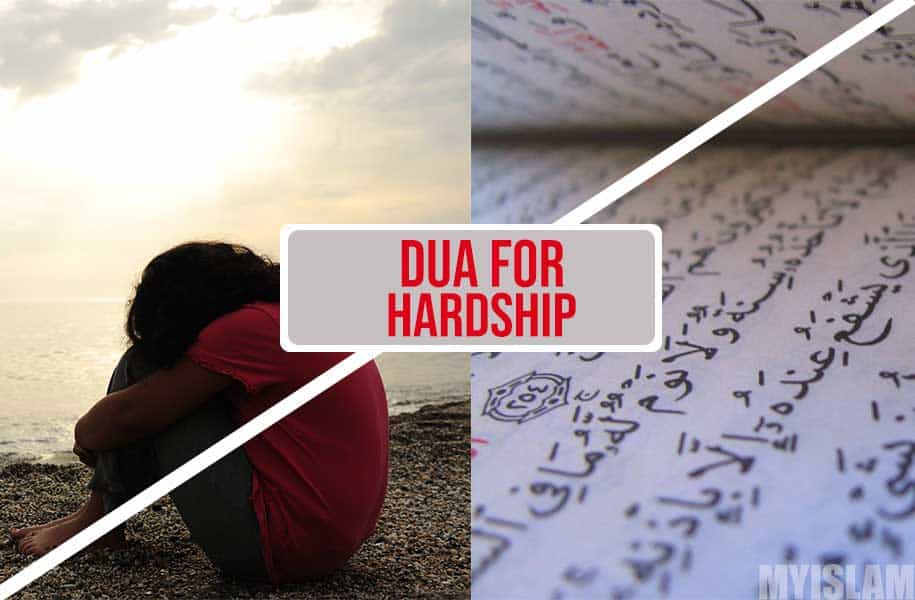
رَبِّ ارْحَمْهُمَا كَمَا رَبَّيَانِي صَغِيرًا
Rabbir hamhumaa kamaa rabbayaanee sagheera
“My Lord, have mercy upon them as they brought me up [when I was] small.”
Surah Isra Ayat 24
Background context:
In the previous ayat, Allah gives a clear commandment and shows the rights of parents over their children:
- Do not make [as equal] with Allah another deity and [thereby] become censured and forsaken.
- And your Lord has decreed that you not worship except Him, and to parents, good treatment. Whether one or both of them reach old age [while] with you, say not to them [so much as], “uff,” and do not repel them but speak to them a noble word.
And the Surah continues, “lower to them the wing of humility out of mercy” and say, Rabbir hamhumaa kamaa rabbayaanee sagheera meaning, My Lord, have mercy upon them as they brought me up [when I was] small.
This is a simple and beautiful du’a that asks Allah to have mercy for both of our parents just as they had for us when we were younger. We aren’t perfect children, we’ve made mistakes and likely did many questionable things to annoy our parents, yet they still loved us, provided for us, and forgave us.
This du’a is a cry to Allah to show our parents the same kind of mercy they had for us.
In Sahih Muslim 1631, Abu Huraira (ra) reported Allah’s Messenger (ﷺ) as saying: When a man dies, his acts come to an end, but three, recurring charity, or knowledge (by which people) benefit, or a pious son who prays for him (for the deceased).
One of the ways that we can honor our parents is to continually remember them in our prayers.
As parents, we must do right by our kids, give them love, attention, and raise them following the teachings of Islam. Inevitably there will come a time where the child will yearn to reciprocate the unconditional love and sacrifice given by parents. In a way, the roles reverse, the child (now an adult) carries the responsibility of wanting to be a source that will benefit and care for his or her parents in their old age and even after their death.
As a family unit, we should make it our aim to help one another and provide support making life easier to bear. We should avoid nagging, disrespect, or creating a hostile environment that we dread returning to.
Instead of fixating on what we expect from one another let us ask ourselves how we can be the best husband, the best mother, or the best brother or sister? What would that mean or look like? What are the actions a person with that title would hold themselves accountable to?
No matter how hard you try you’ll never be able to change other person’s behavior. Begin with raising your standards, and lead in the front without any expectation of getting anything in return. If you give and sustain this output for a long enough period they will come around. Respect when it is received is reciprocated.
The Qur’an and Hadith
In the hadith Sunan an-Nasa’i 2545, it was narrated from Abu Mas’ud that the Prophet said: “When a man spends on his family, seeking reward for that, that is an act of charity on his part.” And in Sunan an-Nasa’i 3104, it was narrated from Mu’awiyah bin Jahimah As-Sulami, that Jahimah came to the Prophet (ﷺ) and said: “O Messenger of Allah! I want to go out and fight (in Jihad) and I have come to ask your advice.” He said: “Do you have a mother?” He said: “Yes.” He said: “Then stay with her, for Paradise is beneath her feet.”
In the Qur’an, “And We have enjoined upon man, to his parents, good treatment. His mother carried him with hardship and gave birth to him with hardship” (46:15)
There’s another verse in the Qur’an which I know many parents love to reference, “And your Lord has decreed that you not worship except Him, and to parents, good treatment. Whether one or both of them reach old age [while] with you, say not to them [so much as], “uff,” and do not repel them but speak to them a noble word.” (17:23)
Ahmad recorded that a man from Banu Yarbu` said: “I came to the Prophet while he was talking to the people, and I heard him saying, ‘The hand of the one who gives is superior. [Give to] your mother and your father, your sister and your brother, then the closest and next closest.”’ (from tafsir by Ibn Kathir)
We should take the time to study the importance of maintaining and nurturing the family unit in Islam. The Qur’an places heavy emphasis and will reward those who actively try to strengthen family relations, “Gardens of perpetual residence; they will enter them with whoever were righteous among their fathers, their spouses, and their descendants. And the angels will enter upon them from every gate, [saying], “Peace be upon you for what you patiently endured. And excellent is the final home.” (13:22-23)
And it tells us the punishment of those who deny or reject it, “Obedience and good words. And when the matter [of fighting] was determined, if they had been true to Allah, it would have been better for them. So would you perhaps, if you turned away, cause corruption on earth and sever your [ties of] relationship?” (47:21-22)




As salaam Alaikum
I would like to ask a question,
is it wrong to read nafal namaaz for the angels and send duas for them.
please advice.
shukran
it is ok to do that for angle May Allah love you as much as you the angles